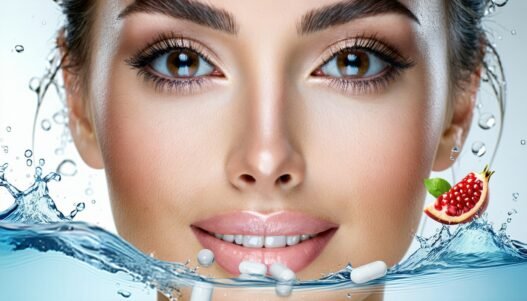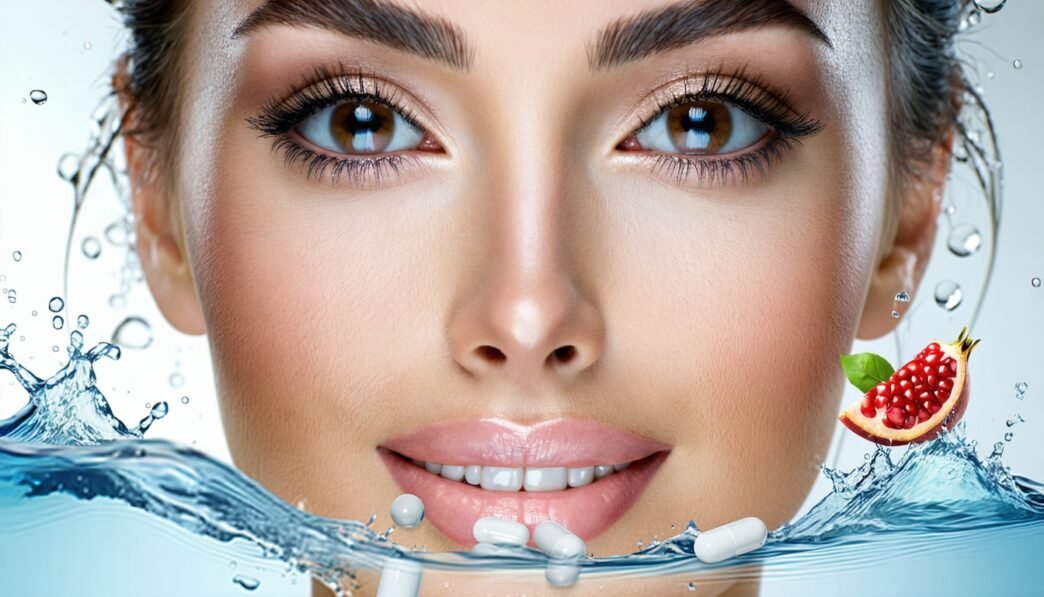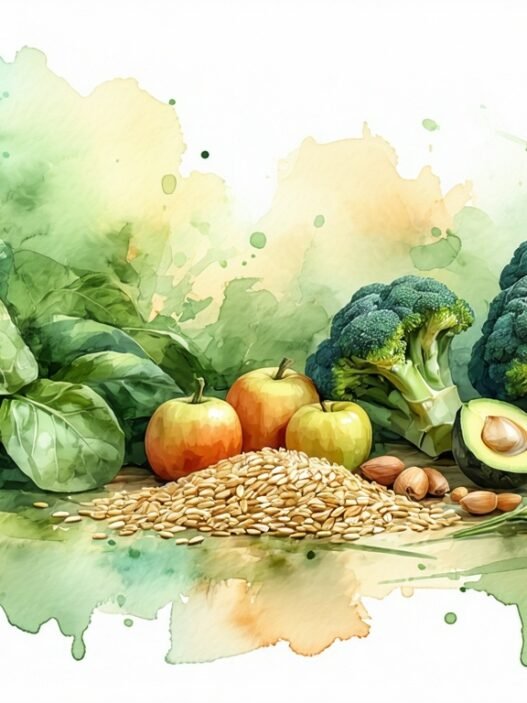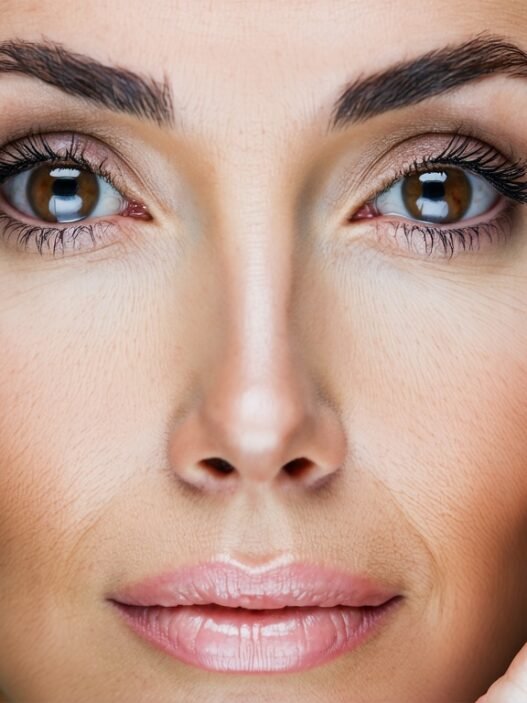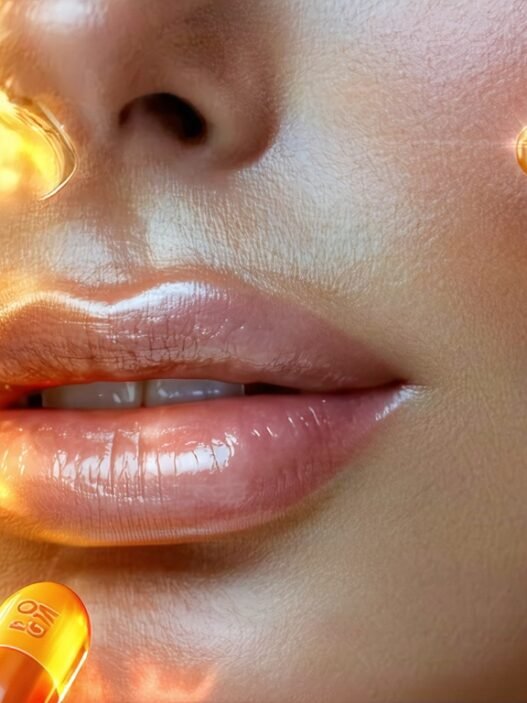Understanding CoQ10 Benefits
Coenzyme Q10 and Skin Aging
Coenzyme Q10 (CoQ10) is a powerful antioxidant that plays a crucial role in combating the visible signs of skin aging. Research has shown that CoQ10 can help reduce wrinkles, fine lines, and other signs of aging. A study involving 33 healthy subjects revealed that 12 weeks of daily supplementation with 50 and 150 mg of CoQ10 significantly reduced wrinkles, microrelief lines, and improved skin smoothness, though it did not significantly affect skin hydration (PubMed).
CoQ10 supports the production of collagen and elastin, key proteins that contribute to skin firmness and elasticity. By aiding in cellular repair processes, CoQ10 promotes healthier and more youthful-looking skin. This makes CoQ10 particularly effective in anti-aging skincare routines, as it helps to mitigate the damaging effects of free radicals and oxidative stress.
Role in Cellular Repair
CoQ10 is essential for cellular repair and regeneration. It boosts cellular energy production, which is critical for maintaining healthy and vibrant skin. In cultured human skin fibroblasts, CoQ10 increased intracellular levels and promoted fibroblast proliferation. Additionally, it increased mRNA expression of type I, IV, VII collagen, elastin, and HSP47, contributing to enhanced collagen production in the skin (National Center for Biotechnology Information).
This cellular support helps to repair damaged skin and improve overall skin texture. CoQ10’s ability to reduce oxidative damage, specifically from UV rays, further underscores its importance in skin health. CoQ10 not only reduces the depth of wrinkles but also provides antioxidant protection when applied directly to the skin (Healthline).
For individuals looking to integrate CoQ10 into their skincare routine, it’s beneficial to look for products that combine CoQ10 with other potent ingredients for maximum effect. Combining CoQ10 with ingredients like fish collagen has shown to improve skin density and reduce wrinkle scores in a controlled study with healthy women aged 40-65 (PubMed Central). For more on combining CoQ10 with other ingredients, read our section on combining CoQ10 with other ingredients.
By understanding the benefits of CoQ10, individuals can make informed choices about integrating this potent antioxidant into their skincare routines. For further insights into its advantages, explore our articles on coq10 and skincare and coq10 antioxidant benefits.
| Study Detail | Results | Source |
|---|---|---|
| 12-week supplementation with 50 and 150 mg of CoQ10 | Reduced wrinkles, improved smoothness, no significant change in hydration | PubMed |
| CoQ10 and collagen production in fibroblasts | Increased collagen, elastin, HSP47 | NCBI |
| 12-week supplementation with CoQ10 and fish collagen | Improved dermis density, reduced wrinkles | PubMed Central |
For more information on how CoQ10 can enhance skin hydration and vitality, visit our section on coq10 and skin hydration.
CoQ10 in Skincare Products
Coenzyme Q10 (CoQ10) plays a pivotal role in the fight against aging. Found in various skincare products, CoQ10 helps preserve the skin’s vitality and elasticity. It is incorporated into products like serums and creams, providing multiple benefits to promote healthier, more youthful-looking skin.
CoQ10 in Anti-Aging Formulas
Anti-aging formulas enriched with CoQ10 aim to combat signs of aging by promoting cellular repair and regeneration. CoQ10 supports the production of Collagen and Elastin, contributing to skin firmness and elasticity. According to NIVEA, by aiding these cellular repair processes, CoQ10 enhances the skin’s overall appearance.
Numerous commercial products utilize CoQ10 due to its proven effectiveness. For instance, the NIVEA Q10 Anti-Wrinkle Power Protecting Day Cream SPF 30 is designed to provide 24-hour protection against free radical damage and environmental stressors, ensuring that the skin remains nourished and energized throughout the day.
| Product Name | Key Benefits | Price Range |
|---|---|---|
| NIVEA Q10 Day Cream SPF 30 | Anti-wrinkle, UV protection | $10 – $15 |
| NIVEA Q10 Night Cream | Anti-aging, rejuvenation | $12 – $18 |
| NIVEA Q10 Serum | Skin smoothness, elasticity | $15 – $25 |
Application Benefits
Applying CoQ10-enriched products can significantly enhance skin hydration and vitality. As demonstrated in a PubMed study, a 12-week course of daily CoQ10 supplementation reduced the appearance of wrinkles and improved skin smoothness in 33 healthy subjects. These results underscore the efficacy of CoQ10 in skincare regimens.
Additionally, CoQ10’s antioxidant properties combat free radicals, reducing fine lines and wrinkles. As highlighted by NIVEA, regular application can improve skin texture and overall health by promoting collagen production and mitigating the damaging effects of environmental stressors.
For those aiming to integrate CoQ10 into their skincare routine, diverse options are available. Besides day and night creams, targeted treatments like eye creams and wrinkle fillers can provide focused benefits. For a comprehensive look at CoQ10 products, visit our guide on coq10 skin care products.
By embracing CoQ10 in your daily regimen, you can leverage its powerful anti-aging and skin-enhancing properties to achieve a radiant, youthful complexion. Explore other related topics such as coq10 benefits for skin, coq10 and skin hydration, and coq10 antioxidant benefits to discover more ways CoQ10 can contribute to your skincare goals.
Scientific Research on CoQ10
Numerous scientific studies explore the benefits of CoQ10, particularly its impact on skin health and collagen production.
Studies on Skin Health
Numerous studies highlight CoQ10’s favorable effects on skin health. An essential double-blind, placebo-controlled study with 33 healthy participants revealed that daily supplementation with 50 and 150 mg of CoQ10 for 12 weeks mitigated seasonal deterioration of skin viscoelasticity, reduced visible signs of aging, decreased wrinkles, and enhanced skin smoothness. However, the study also noted that CoQ10 supplementation did not significantly affect skin hydration and dermis thickness.
Another study involving a liquid food supplement combining water-soluble CoQ10 (50 mg) and fish collagen (4.0 g) over 12 weeks demonstrated improved dermis density, reduced wrinkle areas around the eyes, a lower total wrinkle score, and enhanced skin smoothness in 34 women aged 40-65 (PubMed Central).
Topical CoQ10 has also been shown to reduce free radicals in the skin. In a study involving volunteers with elevated oxidative stress levels, topical Q10 application significantly decreased free oxygen radicals, showcasing its antioxidant effect (PubMed Central). This reduction in oxidative stress is critical for maintaining skin vitality and may contribute to the anti-aging properties often attributed to CoQ10.
| Study Type | Participants | Duration | Dosage | Key Findings |
|---|---|---|---|---|
| Double-blind, placebo-controlled | 33 healthy adults | 12 weeks | 50-150 mg/day | Reduced wrinkles, improved smoothness, no significant effect on hydration |
| Double-blind, placebo-controlled | 34 women aged 40-65 | 12 weeks | 50 mg CoQ10 + 4.0 g fish collagen/day | Improved dermis density, reduced wrinkle score, enhanced smoothness |
| Topical treatment study | Volunteers with elevated oxidative stress | N/A | Topical Q10 | Significant reduction in free oxygen radicals |
Effect on Collagen Production
CoQ10 also plays a significant role in collagen synthesis within the skin. Collagen is crucial for maintaining skin firmness and elasticity. According to NIVEA, CoQ10 supports the production of collagen and elastin, contributing to overall skin vitality by aiding in cellular repair processes.
In vitro studies have further confirmed CoQ10’s role in boosting collagen production. Research on cultured human skin fibroblasts demonstrated that CoQ10 treatment increased intracellular CoQ10 levels and promoted fibroblast proliferation (National Center for Biotechnology Information). Additionally, CoQ10 increased mRNA expression of type I, IV, VII collagen, elastin, and HSP47, which are essential proteins for skin structure and function.
Moreover, CoQ10’s ability to enhance collagen production also aligns with its role in cellular repair and antioxidant protection. By reducing oxidative stress and promoting healthy cellular function, CoQ10 can help maintain youthful and resilient skin.
For readers interested in other benefits and detailed usage recommendations of CoQ10, please visit our articles on coq10 benefits for skin, coq10 for anti-aging skincare and coq10 and collagen production.
Application and Use
CoQ10 in Skincare Routines
CoQ10, short for coenzyme Q10, is often incorporated into both morning and evening skincare routines due to its powerful anti-aging properties. This antioxidant works by neutralizing free radicals, which helps reduce oxidative stress and promote cellular repair and regeneration. To maximize its benefits, it’s usually applied before heavier skincare products, such as moisturizers.
In the morning, users can apply CoQ10 serums or creams after cleansing and toning but before sunscreen. At night, it should be applied in a similar sequence but before the application of overnight masks or heavy night creams. Consistent use can enhance skin hydration and vitality, making it a key component in anti-aging skincare regimens. For more insights into its anti-aging properties, visit our article on coq10 anti-aging properties.
Combining with Other Ingredients
CoQ10 is versatile and works well with various other skincare ingredients to amplify its benefits. Combining CoQ10 with ingredients like aloe vera, vitamin C, vitamin B3, and hyaluronic acid can create a potent synergy that enhances skin health and hydration.
Aloe Vera: Provides soothing and anti-inflammatory benefits, making it ideal for sensitive skin types.
Vitamin C: Enhances the antioxidant effects of CoQ10, protecting the skin from environmental damage while boosting collagen production.
Vitamin B3 (Niacinamide): Helps to improve skin texture, reduce the appearance of pores, and enhance the skin barrier function.
Hyaluronic Acid: A powerful humectant that attracts and retains moisture in the skin, making it an excellent companion to CoQ10 for promoting hydration.
| Ingredient | Key Benefits | Suitable For |
|---|---|---|
| Aloe Vera | Soothing, Anti-inflammatory | Sensitive Skin |
| Vitamin C | Antioxidant, Collagen Boosting | Aging Skin |
| Vitamin B3 | Texture Improvement, Barrier Support | All Skin Types |
| Hyaluronic Acid | Hydration, Moisture Retention | Dry Skin |
Combining these ingredients can address multiple skin concerns simultaneously, enhancing the overall effectiveness of your skincare routine. For more information on incorporating CoQ10 into your skincare regimen, take a look at our guide on coq10 for anti-aging skincare.
Understanding how to effectively integrate CoQ10 with other powerhouse ingredients can result in youthful, hydrated, and revitalized skin. Explore our articles on coq10 supplements for energy and coq10 antioxidant benefits for additional benefits of CoQ10.
Potential Health Benefits
Improved Skin Health
Coenzyme Q10 (CoQ10) offers numerous benefits for improving skin health, particularly concerning hydration and vitality. By supporting the production of collagen and elastin, CoQ10 contributes to skin firmness and elasticity (NIVEA). This action aids in cellular repair processes, promoting healthier and more youthful-looking skin.
CoQ10 functions as an antioxidant, protecting the skin from oxidative damage caused by free radicals. This is crucial for minimizing signs of aging such as wrinkles and fine lines. For a more detailed understanding of how CoQ10 fights wrinkles, check out our article on coq10 and wrinkles.
Moreover, CoQ10 supports cellular energy production, ensuring that skin cells have the energy required to regenerate and repair. This is vital for maintaining a smooth and hydrated complexion. By incorporating CoQ10 into your skincare routine, you can enhance your skin’s overall health and vitality. For product recommendations, see our guide on coq10 skin care products.
Role in Anti-Cancer Effects
CoQ10 may also play a role in reducing the risk of certain cancers. Research suggests that low levels of CoQ10 are linked to a higher risk of cancers such as breast, prostate, and lung cancer. The potential anti-cancer effects of CoQ10 are attributed to its ability to reduce oxidative stress and inhibit the growth of cancer cells.
Studies indicate that CoQ10 can help maintain mitochondrial function, which is crucial for cellular energy and overall cellular health (NCBI – Phytotherapy Research). Given the role of mitochondria in cellular respiration and energy production, CoQ10’s support of mitochondrial function can contribute to healthier cells and potentially reduced cancer risk.
| Potential Cancer Type | Risk Reduction |
|---|---|
| Breast Cancer | Moderate |
| Prostate Cancer | Moderate |
| Lung Cancer | Moderate |
For more detailed information on CoQ10’s health benefits, explore our articles on coq10 for youthful skin and coq10 antioxidant benefits.
By addressing both skin health and potential anti-cancer effects, CoQ10 emerges as a versatile component in both skincare and overall health regimens. To further delve into how CoQ10 can benefit you, visit our comprehensive guides on coq10 and skin hydration and best coq10 supplements.
CoQ10 and Age-Related Conditions
Coenzyme Q10 (CoQ10) is renowned for its potential anti-aging benefits, particularly in combating age-related changes in the skin. It plays a crucial role in enhancing skin hydration and vitality, key concerns for individuals aged 35-65. This section explores the impact of CoQ10 on skin density and its effects on wrinkles.
CoQ10 and Skin Density
CoQ10 has been shown to improve skin density, which often decreases with age. A double-blind, placebo-controlled study involving 34 healthy women aged 40-65 found that a 12-week regimen of a liquid supplement combining water-soluble CoQ10 (50 mg) and fish collagen (4.0 g) led to a noticeable increase in dermis density (PubMed Central).
Enhanced skin density is crucial for maintaining a youthful appearance, as it contributes to firmness and elasticity. It reinforces the skin’s structural integrity, making it more resilient to the signs of aging. For more information on the benefits of CoQ10 for skin elasticity, visit coq10 for skin elasticity.
Effects on Wrinkles
The effects of CoQ10 on wrinkles have been extensively studied, highlighting its potential to reduce visible signs of aging. A double-blind, placebo-controlled experiment with 33 healthy subjects revealed that a 12-week daily supplementation with 50 and 150 mg of CoQ10 significantly reduced wrinkles, microrelief lines, and improved skin smoothness.
Here is a summary of the study’s findings:
| Parameter | CoQ10 Supplementation (50 mg) | CoQ10 Supplementation (150 mg) |
|---|---|---|
| Wrinkle Reduction | Significant | Significant |
| Microrelief Line Reduction | Significant | Significant |
| Skin Smoothness | Improved | Improved |
For more insights on how CoQ10 can help with reducing wrinkles, check out our dedicated article on coq10 and wrinkles.
In addition to reducing wrinkles, CoQ10 in skincare products, such as serums and creams, helps combat free radicals and promotes collagen production. This makes CoQ10 an excellent ingredient for improving skin appearance, texture, and overall health. Learn more about how CoQ10 boosts collagen production in our article on coq10 and collagen production.
By incorporating CoQ10 into your skincare routine and diet, you can address common age-related skin concerns, promoting youthful and vibrant skin. For optimal results, combine CoQ10 with other beneficial ingredients and maintain a consistent skincare routine. Discover the best products and tips for using CoQ10 in our guide to coq10 for anti-aging skincare.










